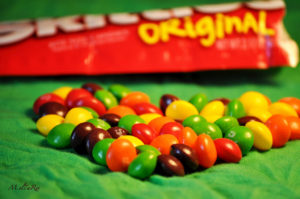“If I had a bowl of skittles and I told you just three would kill you. Would you take a handful? That’s our Syrian refugee problem.”
Donald Trump Junior – September 19, 2016

What do you do? Do you ignore the statement and hope the controversy will blow over in the short attention span theater of the campaign news cycle? Do you attack Donald Trump Junior for unfairly using your product to make his point?
Within hours of Trump’s tweet (one that was called “truth telling” by his father, the Republican nominee for President) Wrigley America, which owns Skittles, made the following statement:
“Skittles are candy. Refugees are people.
We don’t feel it is an appropriate analogy.
We will respectfully refrain from further commentary as anything we say could be misinterpreted as marketing.”
This statement was widely praised on social media almost the moment it was released. It turned potential critics into credible outside source defenders of the candy’s honor. The statement has lessons to teach anyone who works in PR or Marketing about how to respond when facing a crisis that is played out in the media.
1. Respond Quickly
Wrigley didn’t wait to do polling, gather a focus group, listen to what experts were saying on TV talk panels or hold their finger in the air to see which way the wind was blowing on the statement. In today’s instant gratification social media world, media deadlines happen 24 hours a day, 7 days a week. Responding fast allows your company to shape the message. Not responding makes your company look like it has a reason to be embarrassed, or worse.
2. Keep it simple
The first line gets its strength from its simplicity. It defuses Trump Junior’s analogy by stating the simple fact that people and candy are not the same thing. By staying above the political fray and not expressing an opinion about the Syrian refugee crisis, the statement avoids taking a side that could offend their customers regardless of their political stance.
3. Don’t apologize for something that isn’t your fault
The Skittles statement didn’t apologize to anyone who may have been offended by what Trump Junior said. Doing so would have made them seem like they thought their product was to blame for what he said rather than the victim of a random decision that just as easily could have involved any other product such as Reese’s Pieces or M&M’s. Wrigley did nothing to deserve the attention and so they have no reason to say they are sorry.
4. Know when to stop
By stating that they will not be commenting further, Wrigley is helping any controversy dissipate. If they had attacked Trump Junior or demanded an apology from him for misusing their popular candy for political gain, it would have extended the news cycle for the issue. The faster something like this is put in the rear view mirror, the better chance it can have to become a footnote in an increasingly bizarre campaign season.


